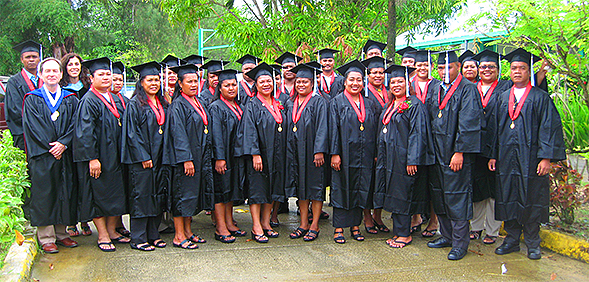Partners in the Pacific
Hundreds of Pacific Islanders have access to higher education through SDSUs Interwork Institute.

In November, Lolo Letalu Matalasi Moliga was elected governor and Lemanu Peleti Mauga was elected lieutenant governor of American Samoa. The two SDSU alumni will assume office on Jan. 3, 2013.
Both are graduates of the Department of Administration, Rehabilitation, and Postsecondary Education’s Master of Arts degree program in Postsecondary Educational Leadership, one of several blended distance learning programs SDSU’s Interwork Institute operates in American Samoa, the Republic of Palau, the Republic of the Marshall Islands and the Federated States of Micronesia.
“By partnering with government agencies and educational institutions in these emerging island nations, SDSU has become an international force in nontraditional distance learning,” said Steve Spencer, director of the Interwork Institute Center for Pacific Studies.
Long history in the Pacific
Interwork’s Center for Distance Learning and Center for Pacific Studies have delivered blended distance learning programs in the Western and South Pacific for the past 20 years. More than 300 students have graduated from the MA and BA programs, and many have assumed challenging leadership positions.
The Interwork Institute’s long history in the Pacific Region is one of collaboration with local institutions in the education and training of K-12 teachers and principals, college instructors and administrators, professionals in the ministries of education and rehabilitation counselors and administrators.
The public administration and curriculum and instruction specialization courses in American Samoa are the newest innovative programs customized to meet identified local demands.
Investing in education
Throughout the small remote island nations of the Pacific, these programs have a tremendous impact. In the Republic of Palau, for example, SDSU partners with Palau Community College to offer bachelor’s and master’s degrees for educators.
More than 200 local K-12 teachers and community college faculty and administrators have graduated from the program since 1998, a significant number in a country with less than 25,000 people.
“Ours is the only local program serving teachers who aspire to more than an associate’s degrees,” said Patrick Tellei, Ph.D., President Palau Community College. “Soon, we will be able to ensure that every teacher in Palau has at least a bachelor’s degree.”
90 percent graduation rate
The program in the Republic of Palau is an example of collaborative success, said Caren Sax, co-director of the Interwork Institute. SDSU establishes transfer requirements for the associate degree students while educational leaders in Palau identify the candidates from a pool of incumbent teachers.
Each group or cohort progresses through the program together. More than 90 percent of students graduate, and nearly all receive financial aid from the government. In addition, SDSU faculty spend time on-site in Palau, providing face-to-face instruction, and then continue the courses via distance education as students progress through the program.
Palau’s investment in higher education along with other Pacific nations now serves as a model for others seeking to offer teachers and other professionals an avenue for career advancement without having to leave the islands they call home.



